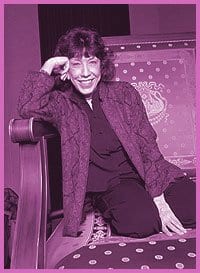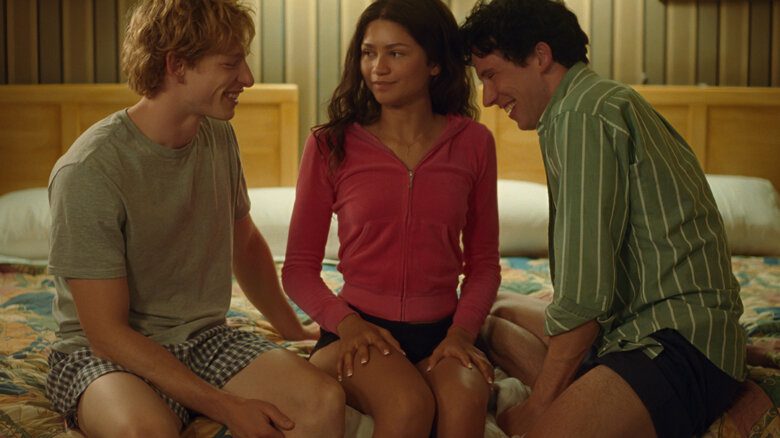“I want to talk to you about your frank film about heterosexuality. Did it seem strange seeing yourself making love to a man on the big screen?”
“Oh, I did a lot of research…. I’ve seen these women all my life. I know how they walk, how they talk…. You don’t have be be one to play one.”
* Lily Tomlin interviewing herself on the hilarious 1975 record Modern Scream
“I like to do this first of all because it’s the thing that keeps me moving around and doing stuff,” says Lily Tomlin about why she still puts herself through the grueling task of performing live on tour. She could claim to be busy enough already, appearing regularly on The West Wing, preparing for a couple of movie roles and developing a series for PBS, based on her Edith Ann character.
“I do it to keep my hand in, and it’s great for people to see someone who has a very long career and who stays interested in their audience.”
And Tomlin certainly does have a long history with her fans. She was catapulted from struggling comic to household name after a single, remarkable television appearance more than 30 years ago.
“My career really started at the beginning of 1970,” she explains. “I aired on Laugh-In on Dec 29, 1969, and Ernestine [the telephone operator] was an absolute overnight sensation.”
Tomlin’s impressive career is now well into its fourth decade, and her achievements are astounding. She has earned Grammy, Emmy and Tony awards, and even an Oscar nomination for her work in film, a medium in which she has collaborated with an impressive list of other household names including Robert Altman, Jane Fonda, Dolly Parton, Steve Martin, Bette Midler, John Travolta and even Cher. And yet Tomlin still finds the inspiration to do the kind of work that others have moved on from.
“People ask, ‘Why do you want to play Des Moines?'” she says. “And I tell them, ‘I’ve got to go to Des Moines, they want to know what, Lud and Marie are doing now!’ I mean, I am so connected into it.
“I do it for the money, too!” she adds, laughing.
But Tomlin recently announced that she is donating a substantial amount of her performance fee for her upcoming Toronto gig to Harbourfront, in support of cultural activities at the centre. She is making the donation as a gesture of thanks for being included as one of the honorees at the centre’s Festival Of Creative Genius last year, an event which she was unable to attend due to a change of plans following the attack on the World Trade Center.
Tomlin comes to Massey Hall for one night only on Fri, Nov 29 to present A Very Special Evening With Lily Tomlin. “Oh, is that what they’re calling it?” she laughs. “That’s nice.”
The show is basically a collection of some of Tomlin’s greatest hits.
“I’ll do lots of different characters, including some of the old favourites,” she says. “I won’t necessarily do old material they used to do, but I’ll do whatever I think is funny and interesting and still relevant.”
Although Tomlin performs comedy, she can’t really be categorized as a stand-up comic.
“Whenever I had an idea for a comic persona, I wanted to turn it into another one of my characters, rather than having the conceit of trying to actually put over the idea that I was, like ‘the last girl on the freeway from Westchester,’ you know, like Joan Rivers used to do,” Tomlin explains. “I wanted to do a variety of characters.”
Her approach made it difficult to get booked on talk shows at the start of her career.
“I’d go over big doing one of the characters but then, when I did the interview portion, they’d say ‘You’re just so ordinary. You’re not kooky like Dody Goodman or Hermione Gingold.’ So I had a running joke that being myself is what kept me in the small money for so many years.”
Her work is more an evolution of the approach by some of the great monologue artists of the ’50s, and she recognizes the influence of people like Lucille Ball, Imogene Coca, Bea Lillie, Jean Carroll and Ruth Draper, whose most well-known recorded monologue is called The Italian Lesson.
“She was a great influence on my work,” says Tomlin. “She was glorious.”
Tomlin explains that it was difficult at the beginning of her career to get people to understand what she was doing, because she was exploring new territory.
“I was a sell-out at comedy clubs because I was so well-
known from Laugh-In,” she recalls,
“but sometimes audiences would sit in absolute silence, because they didn’t know how to react. But I learned not to doubt what I was doing.”
Tomlin’s work has a subversive edge, but she says her drive to communicate comes more from a “childlike, joyful desire to share ideas” than from some kind of political agenda. She realized very early that “people are screwed up and have flaws,” but developed a genuine compassion for people of all kinds – which is always evident in her material.
“I grew up in an old apartment house in Detroit,” she says. “There was every kind of person there and I was in love with all of them. I would go from apartment to apartment and hang out with them all.”
She describes herself as a independent and willful child, and was not easily disciplined.
“My father once slapped my leg with his belt, which made a little mark,” she recalls. “So I went through the apartment building and showed everybody the mark, and told them my father was beating me.”
Although she has lived openly for many years with her longtime companion and writing partner Jane Wagner, Tomlin has taken a lot of criticism in the US gay and lesbian media for her stand on coming out in the mainstream press. Although she never deceived anybody when it came to the issue of her sexuality, she is also quick to admit that she never pushed the envelope, either.
“I’ve been around a long time, and I interviewed with a lot of the same people over and over,” she says. “I was always direct and open about my life. I would always reference Jane and everything, but they never chose to write about it that way – just like they never wrote about Jack Kennedy and the women in the swimming pool.
“It was the times, but the media culture has changed.”
As for Tomlin’s latest work, she is absolutely thrilled to be on The West Wing.
“They’ve written a great role for me. I’m this incredibly mysterious character with lots of contradictions. Her first day on the job she was so nervous that she took a couple of pills, got high and was completely inappropriate.”
Tomlin doesn’t know what’s in store for the character, but guarantees it’s going to be worth following.
“She’s very outspoken, independent and very smart,” says Tomlin. “I wanted the part really badly. I lobbied hard for it and I got it.”
A VERY SPECIAL EVENING WITH LILY TOMLIN
$49.50-$74.50. 8pm.
Fri, Nov 29.
Massey Hall.
178 Victoria St.
(416) 870-8000.

 Why you can trust Xtra
Why you can trust Xtra


